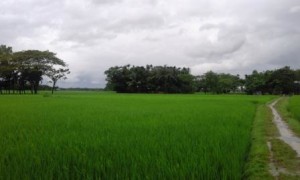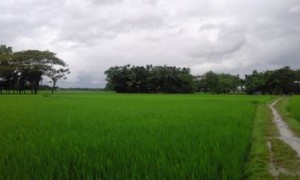
Why Farming is Important
Bahauddin Bahar
My journey with BARCIK started off in 2011 first through fellowship and for the second time as an assistant researcher in 2012. In 2014, I finally joined BARCIK as an employee. Every time I decided to fully understand BARCIK’s objectives, I always came up with one issue-and that is agriculture. People seem to have fixed in their minds that BARCIK primarily deals with the farming issues and problems of the country. I have always wondered- can the works of BARCIK be explained or represented only in the agriculture sector? Finally, one day I came up part of the answer to this question with the very assistance of Avijit Roy, teacher of the Anthropology Department at Rajshahi University and BARCIK coordinator Syed Ali Biswas which I intend to share with you here.
From 2001 to 2004, BARCIK has been trying to understand the way people try to conserve the natural resources and their relationship with the available natural resources. It has tried to grasp the ways that the people work at one with the nature and conserve these valuable reserves of natural resources through their daily life. Also, BARCIK tries to understand how people survive by making the best use of these natural resources and has documented all these information for these years. For this documentation, the primary focus of BARCIK has been:
- natural resources
- Its usage and
- Its conservation
All these three factors are in one way or the other related to farming and farming is intimately related to the source and the gain of knowledge.
The question now stands: Why is BARCIK so eager to understand the knowledge held by farmers about farming, where modern day knowledge is much more effective in solving problems?
We have always understood that farming is a matter of production, marketing and calculations of profit or loss. It is also a matter of assurance for farmers that their families will not go starved. However, BARCIK realizes that farming is not only a matter of the stated issues to the farmer. To a farmer, farming is a matter of social bonds and understanding and solidarity towards others. Farming provides a mutual friendship between communities in a village. Also, farming is very much related to the environment and nature of a community. Through this sector of work, people tend to preserve their cultural values which have been passed down through the generations. But when this very topic is being presented by an agent, the most important issues raised are that of profit, farming equipment required and the issue of food security. The very meaning of farming is then lost and the only thing that matters is how much food can be produced and marketed at maximum profit. It does not understand or depict the deep relations between the farmer and farming. Therefore, BARCIK realizes that in order to properly understand farmers of the country, it has to dig deep at the very core of farming and start from the root level. So, when BARCIK talks about diversity, it means the diversity understood by the farmers. We also have to realize that agriculture is one of the main sources of survival in Bangladesh. Thus, in order to progress properly, we have to give value to the farmer’s perspective of farming and plan our cultural relations, environment and economy around their opinions of agriculture.
The primary weapon in the farming sector is seed for harvesting crops. So, obviously some of the main problems around farming revolves around the seeds; that is commercialization of seeds with political patronizing. Thus once the seeds go from the source to the company or open market, the farmer is no longer in contact with that particular product and the mutual relationship between the farmer and the seeds in the market becomes obsolete. The unity between different communities in an area becomes severed and therefore, the dependency is removed. This mutual understanding comes not from the open market but through years of trust and respect for one another. This reliability is not only confined between humans, but also towards the nature and the environment they live in. The quality of farming ensures the quality of fish in the area, which in turn determines the future of the bamboo-industry in the country. Good bamboo products are always in high demand for catching fish and so fisherman, farmers and bamboo producers are quite closely related in such rural communities than in urban areas where the main sources for these products are often the open market. So, if the fish produced also becomes a commercial commodity, the art of bamboo and pottery will be lost since potters also rely heavily on the quality of land they live on which is often determined by the surrounding farmed areas. If the soil was to be separated from good quality seeds, its fertility will be lost and so will the fish, bamboo and pottery produced.
The main problem currently presiding in Bangladesh is the lack of jobs available. The high population growth rate in the country means that much more people are applying for a particular job. The best solution here would be creating extra jobs for people for improving their livelihood. Every day, numbers of farmer, potters and fishermen lose their jobs because their respective sectors are closing down, being sold to companies or slowly becoming obsolete in the progress of the country. Therefore, new jobs must be created with a high level of inter-dependence at play. We must understand that when this dependency ceases to exist, we are literally becoming businessmen-we are either the seller or the purchaser. The main spirit is lost and we stop gaining knowledge, thereby handing over total control to the company and the market. And since, the knowledge is no longer being produced from the community, these slots are being filled by companies and investors from overseas. As a result, farmers will be restricted to producing only one kind of fish, bamboo makers and potters will be forced to produce to only certain equipment and in the end, farming will be affected and damaged greatly.
To prevent this, we must protect every natural resources available to us and the people of the community who take charge of each sector. We must create a system that is both inter-dependent and at the same individually independent. We must protect farmers with the help of other farmers, while making sure that each farmer is mentally strong enough to protect his own natural resources. Each link in the system must be very strong and cooperative. This is what BARCIK has been trying to do. With the creation of many new fronts in different areas, BARCIK is now trying to facilitate farmers and other occupational groups conserving the natural resources of the country as well as the people who make good use of them.
BARCIK had indeed started off with the agricultural sector of this country. But now, farming is no longer just a source of food production. Farming now represents much more than the source of a basic commodity of the country. BARCIK realizes and promotes the fact that farming is the way that the people of a community depend on each other and uphold their cultural values. Therefore, by working with farmers and encouraging farming as a means of reliability on nature and dependency on other people of the community, BARCIK hopes to achieve a perfect system of inter-dependency.
Translated by Adit Narayan Adhikary

